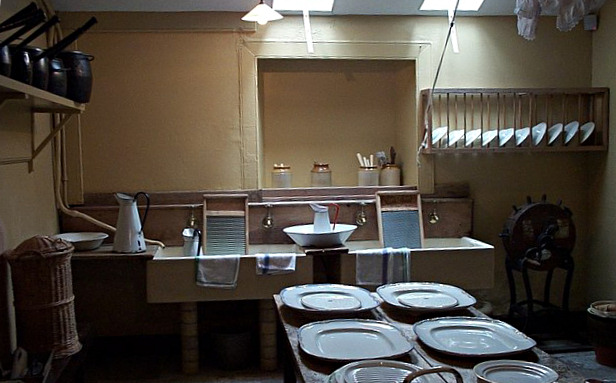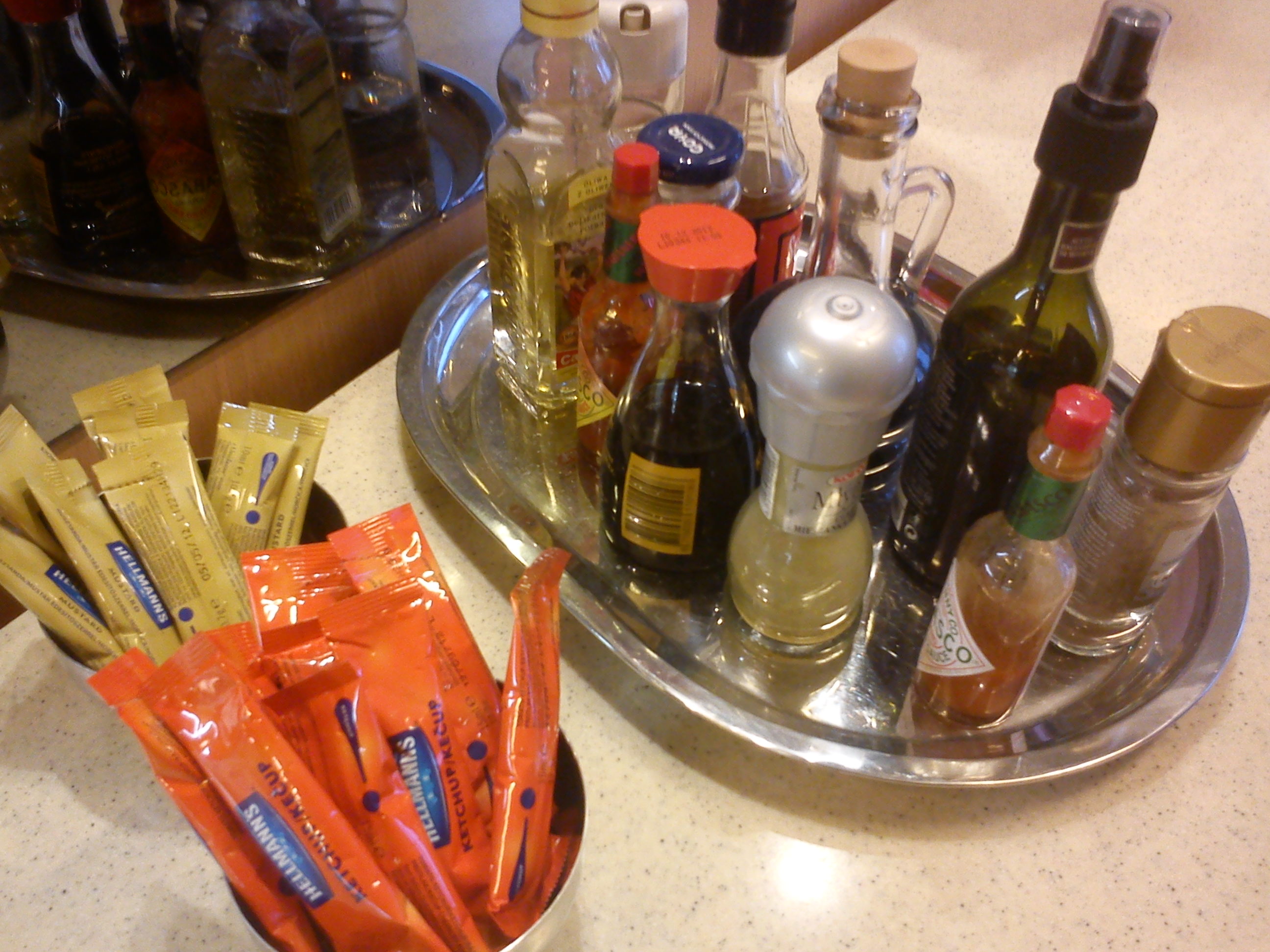|
Saucery
A saucery was the office in a medieval household responsible for sauces, as well as the room in which the preparation of sauces took place. It was headed by a saucerer. The office was subordinated to the kitchen, and existed as a separate office only in larger households. It was closely connected with other offices of the kitchen, such as the spicery and the scullery. The term is largely obsolete today. See also * Condiment * Sorcery (other) * Saucier A saucier () or sauté chef is a position in the classical brigade style kitchen. It can be translated into English as ''sauce chef''. In addition to preparing sauces, the saucier prepares stews, hot hors d'œuvres, and sautés food to order. ... References Medieval cuisine {{cuisine-stub ... [...More Info...] [...Related Items...] OR: [Wikipedia] [Google] [Baidu] |
Medieval Household
The medieval household was, like modern households, the center of family life for all classes of European society. Yet in contrast to the household of today, it consisted of many more individuals than the nuclear family. From the household of the king to the humblest peasant dwelling, more or less distant relatives and varying numbers of servants and dependents would cohabit with the master of the house and his immediate family. The structure of the medieval household was largely dissolved by the advent of privacy in early modern Europe. Variations were immense over an entire continent and a time span of about 1000 years. Yet it is still possible to speak of a classical model of the medieval household, particularly as it evolved in Carolingian France and from there spread over great parts of Europe. Historical background Neither Greek nor Latin had a word corresponding to modern-day "family". The Latin ''familia'' must be translated to "household" rather than "family". The ari ... [...More Info...] [...Related Items...] OR: [Wikipedia] [Google] [Baidu] |
Sauces
In cooking, a sauce is a liquid, cream, or semi-solid food, served on or used in preparing other foods. Most sauces are not normally consumed by themselves; they add flavor, moisture, and visual appeal to a dish. ''Sauce'' is a French word taken from the Latin ''salsa'', meaning ''salted''. Possibly the oldest recorded European sauce is garum, the fish sauce used by the Ancient Romans, while doubanjiang, the Chinese soy bean paste is mentioned in '' Rites of Zhou'' in the 3rd century BC. Sauces need a liquid component. Sauces are an essential element in cuisines all over the world. Sauces may be used for sweet or savory dishes. They may be prepared and served cold, like mayonnaise, prepared cold but served lukewarm like pesto, cooked and served warm like bechamel or cooked and served cold like apple sauce. They may be freshly prepared by the cook, especially in restaurants, but today many sauces are sold premade and packaged like Worcestershire sauce, HP Sauce, soy sauce ... [...More Info...] [...Related Items...] OR: [Wikipedia] [Google] [Baidu] |
Kitchen
A kitchen is a room or part of a room used for cooking and food preparation in a dwelling or in a commercial establishment. A modern middle-class residential kitchen is typically equipped with a stove, a sink with hot and cold running water, a refrigerator, and worktops and kitchen cabinets arranged according to a modular design. Many households have a microwave oven, a dishwasher, and other electric appliances. The main functions of a kitchen are to store, prepare and cook food (and to complete related tasks such as dishwashing). The room or area may also be used for dining (or small meals such as breakfast), entertaining and laundry. The design and construction of kitchens is a huge market all over the world. Commercial kitchens are found in restaurants, cafeterias, hotels, hospitals, educational and workplace facilities, army barracks, and similar establishments. These kitchens are generally larger and equipped with bigger and more heavy-duty equipment than a residential ... [...More Info...] [...Related Items...] OR: [Wikipedia] [Google] [Baidu] |
Spicery
A spicery was the office in a medieval or Renaissance household responsible for spices, as well as the room in which the spices were kept. It was headed by a spicerer. The office was subordinated to the kitchen or the wardrobe, and existed as a separate office only in larger households. It was closely connected with other offices of the kitchen, such as the saucery and the scullery. The term is largely obsolete today, and if used at all is more often simply a synonym A synonym is a word, morpheme, or phrase that means exactly or nearly the same as another word, morpheme, or phrase in a given language. For example, in the English language, the words ''begin'', ''start'', ''commence'', and ''initiate'' are all ... for spices. References Medieval cuisine {{condiment-stub ... [...More Info...] [...Related Items...] OR: [Wikipedia] [Google] [Baidu] |
Scullery (room)
A scullery is a room in a house, traditionally used for washing up dishes and laundering clothes, or as an overflow kitchen. Tasks performed in the scullery include cleaning dishes and cooking utensils (or storing them), occasional kitchen work, ironing, boiling water for cooking or bathing, and soaking and washing clothes. Sculleries contain hot and cold sinks, sometimes slop sinks, drain pipes, storage shelves, plate racks, a work table, various coppers for boiling water, tubs, and buckets. The term "scullery" has fallen into disuse in North America, as laundry takes place in a utility room or laundry room. The term continues in use in its original sense in Britain and Ireland amongst the middle classes, or as an alternative term for kitchen in some regions of Britain, typically Northern Ireland, North East England and Scotland, or in designer kitchens. In United States military facilities and most commercial restaurants, a "scullery" refers to the section of a dining facili ... [...More Info...] [...Related Items...] OR: [Wikipedia] [Google] [Baidu] |
Condiment
A condiment is a preparation that is added to food, typically after cooking, to impart a specific Flavoring, flavor, to enhance the flavor, or to complement the dish. A table condiment or table sauce is more specifically a condiment that is served separately from the food and is added to taste by the diner. Condiments are sometimes added prior to serving, for example, in a sandwich made with ketchup, mustard (condiment), mustard or mayonnaise. Some condiments are used during cooking to add flavor or texture: barbecue sauce, compound butter, Teriyaki#Teriyaki sauce, teriyaki sauce, soy sauce, Marmite and sour cream are examples. Many condiments, such as mustard or ketchup, are available in Packet (container), single-serving packets, commonly when supplied with take-out or fast food meals. Definition The exact definition of a condiment varies. Some definitions encompass Spice, spices and Herb, herbs, including salt and pepper, using the term interchangeably with ''seasoning''. O ... [...More Info...] [...Related Items...] OR: [Wikipedia] [Google] [Baidu] |
Sorcery (other)
Sorcery may refer to: * Magic (supernatural), the application of beliefs, rituals or actions employed to subdue or manipulate natural or supernatural beings and forces ** Witchcraft, the practice of magical skills and abilities * Magic in fiction, the use of supernatural magic in works of fiction * Sorcery (horse) (1808 – after 1832), British Thoroughbred racehorse Arts and entertainment * ''Sorcery!'', 1983–1985 gamebook series by Steve Jackson ** ''Sorcery!'' (video game), 2013–2016 video game series based on the gamebooks * ''Sorcery'' (video game), 2012 video game * Sorcery (band), American rock band active 1976–1987 * ''Sorcery'' (Jack DeJohnette album), 1974 jazz album by Jack DeJohnette * ''Sorcery'' (Kataklysm album), 1995 death metal album by Kataklysm * ''Sourcery'', 1988 fantasy novel by Terry Pratchett * '' Sorcery 101'', 2005 webcomic by Kel McDonald See also * Sorcerer (other) Sorcerer may refer to: Magic * Sorcerer (supernatural), a pr ... [...More Info...] [...Related Items...] OR: [Wikipedia] [Google] [Baidu] |
Saucier
A saucier () or sauté chef is a position in the classical brigade style kitchen. It can be translated into English as ''sauce chef''. In addition to preparing sauces, the saucier prepares stews, hot hors d'œuvres, and sautés food to order. Although it is often considered the highest position of the station cooks, the saucier is typically still tertiary to the chef and sous-chef. Escoffier definition In Georges Auguste Escoffier's system of the classic kitchen brigade, outlined in his ''Guide Culinaire'', the saucier is "responsible for all sautéed items and most sauces". Sauciers in popular culture The 1979 film ''Apocalypse Now'' character, "Chef" Hicks (played by Frederic Forrest) says that he was "raised to be a saucier" in New Orleans. In ''Tropic Thunder'', the character Kirk Lazarus (played by Robert Downey Jr.) claims to have been a saucier in San Antonio in reference to ''Apocalypse Now.'' In ''Futurama'', Bender Bending Rodriguez claims the title of "Zinc Sauc ... [...More Info...] [...Related Items...] OR: [Wikipedia] [Google] [Baidu] |


_(7563655820).jpg)

